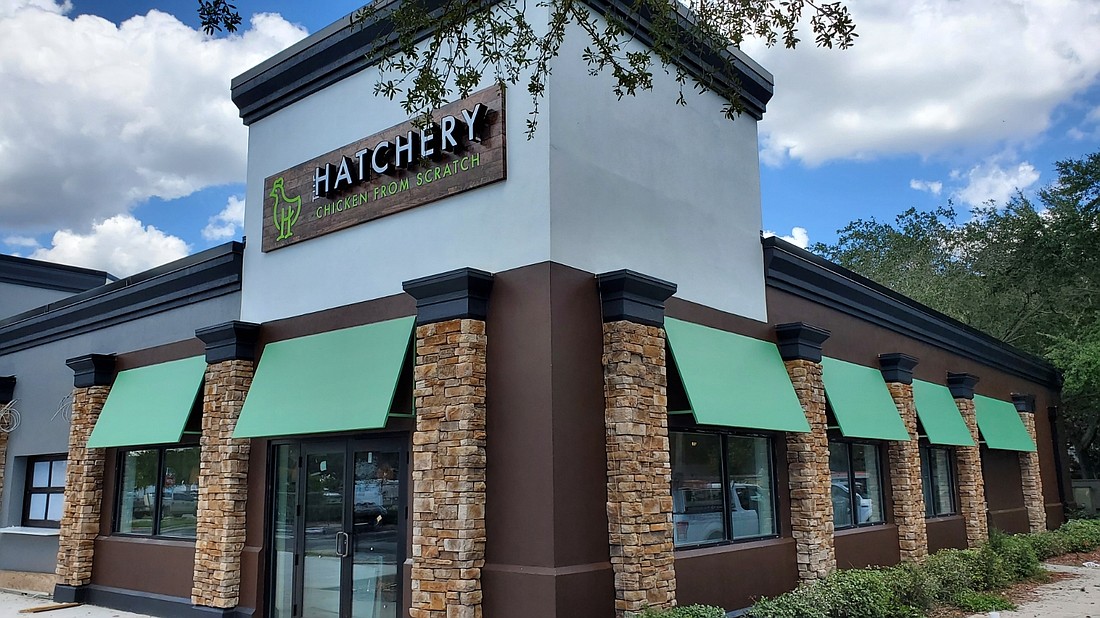- December 25, 2024
-
-
Loading

Loading

Watch out, Chick-Fil-A. Be on your guard, PDQ. Prepare yourself, Popeye’s. The fast-casual chicken restaurant category has a new player: The Hatchery. It’s backed by FSC Franchise Co., the Tampa-based entity that owns the Beef O’ Brady’s and Brass Tap brands, which collectively have more than 20 locations across the Tampa Bay region.
The Hatchery debuted Aug. 31 with a grand opening at its first location, 201 N. Dale Mabry Highway in south Tampa. Although excited about the future, CEO Chris Elliott admits it’s a challenging time, to say the least, to unveil a brand-new restaurant concept.
“Given the choice, we wouldn't have opened in a pandemic where you have plastic shields between the booths, and people have to wear a mask,” Elliott says. “But we're working through it.”
‘A lot of consumers have shifted their behavior to either picking food up after ordering online or using third-party delivery. But I think that will change after the pandemic and be more balanced.’ Chris Elliott, CEO of FSC Franchise Co., which owns the Beef O’ Brady’s and Brass Tap brands
Elliott, 66, has been with FSC Franchise Co. since 2010. Before that, he served as president of Cinnabon and COO of Church’s Chicken, so he knows a thing or two about developing fast-casual and quick-service restaurant chains. He says The Hatchery has been in the works for about three years and represents FSC’s attempt to capture a share of the lucrative chicken market.
“Chick-Fil-A does more volume in six days selling chicken than McDonald’s does in seven days selling burgers,” he says. “So what does that tell you? There’s a huge opportunity in that segment.”
The Hatchery, however, faces significant headwinds in an economy still reeling from the COVID-19 crisis. Beef O’ Brady’s revenues were down 7% in July, Elliott says, while the Brass Tap — partially because it’s a bar and subject to additional restrictions — continues to struggle, with sales down 20% in July.
And unlike rivals Chick-Fil-A and PDQ, The Hatchery is not equipped with a drive-thru, though Elliott says future locations might have that feature. That means the restaurant has to do everything it can to give customers the confidence to dine in and pick up takeout orders.
Although it’s still early days for The Hatchery, day one got off to a good start, with 60% of revenue coming from off-premise orders, Elliott says, and 40% from in-store sales. “A lot of consumers have shifted their behavior to either picking food up after ordering online or using third-party delivery,” he says. “But I think that will change after the pandemic and be more balanced.”
The buildout for The Hatchery cost $650,000, Elliott says, and he expects the restaurant to generate $1.5 million in gross revenue per year and employ 25-30 people. FSC is already looking to open a second Hatchery restaurant in either Trinity or St. Petersburg.
The pro forma, Elliott says, calls for a two-to-one sales to investment ratio.
“We think that's a very conservative number,” he adds. “We think we can do much, much better than that, but at 2,400 square feet, it’s a small footprint, with no drive-thru. You put a drive-thru on it, then you’re talking $2 million plus.”
An intriguing footnote to The Hatchery’s development is how it started — as an accidental ghost kitchen. Construction of the restaurant began in January but ceased in March due to the pandemic. To keep momentum going — and get a sense of how the new concept would be received — FSC made items developed specifically for The Hatchery menu at the firm’s test kitchen in its head office in Tampa. Then it partnered with third-party delivery services, such as Uber Eats, GrubHub and BiteSquad, to make the food available to customers in south Tampa.
“There has been a lot of talk in the industry around virtual kitchens and ghost kitchens,” Elliott says. “And we said, ‘Well, why don't we try this until we can get back under construction again and see what we can learn. So we ran it as a ghost kitchen for eight weeks. It wasn't what we’d originally planned, but it just worked out that way.”
It’s also a perfect example of not letting external circumstances out of your control define and shape your reality — a point not lost on Elliott.
“Maybe some people think we’re crazy for opening in the middle of a pandemic, but the work had already begun, and we think it’s a great idea,” he says. “We think it'll do much better after the pandemic, but we're confident that going ahead and opening was the right move.”